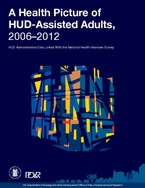0
Research
Community:
Jan 1, 2019
Homelessness during pregnancy poses significant health risks for mothers and infants. As health care providers increase their emphasis on social determinants of health, it is important to understand how unstable housing contributes to complications during pregnancy. We linked data about emergency shelter enrollees with Massachusetts Medicaid claims for the period January 1, 2008–June 30, 2015 to compare health care use and pregnancy complications for 9,124 women who used emergency shelter with those for 8,757 similar women who did not. Rates of mental illness and substance use disorders were significantly higher among homeless women. Adjusted odds of having nine pregnancy complications were also significantly higher for homeless women and remained substantially unchanged after we adjusted for behavioral health disorders.
Authored by: Robin Clark, Linda Weinreb, Julie Flahive, and Robert Seifert for Health Affairs
Topics: Child welfare, Depression, Early childhood, Homelessness, Housing, Low-income, Mental health, Pre-natal, Research, Substance abuse
 Shared by Housing Is
Shared by Housing Is
Housing Is posted a
on Mar 26, 2019
Robin Clark, Linda Weinreb, Julie Flahive, and Robert Seifert for Health Affairs
Homelessness during pregnancy poses significant health risks for mothers and infants. As health care providers increase their emphasis on social determinants of health, it is important to understand how unstable housing contributes to complications during pregnancy.
0
Publication
Community:
Nov 20, 2018
People with mental health disabilities are vastly overrepresented in the population of people who experience homelessness. Of the more than 550,000 people in America who experienced homelessness on a given night in 2017, 1 in 5 had a mental illness. The proportion of people experiencing chronic homelessness with mental health disabilities was even higher—nearly 1 in 3. Despite this fact, the reality is that most people with mental illness fortunately do not experience homelessness: While about 20 percent of all adults in the United States have a mental illness, less than two-tenths of 1 percent of people in the country experienced homelessness on a given night in 2017.
Authored by: Heidi Schultheis for Center for American Progress
Topics: Depression, Disabilities, Homelessness, Housing, Legislation & Policy, Low-income, Mental health, Partnerships, Preventative care, Stability, Substance abuse, Supportive housing
 Shared by Mica O'Brien
Shared by Mica O'Brien
Mica O'Brien posted a
on Nov 20, 2018
Heidi Schultheis for Center for American Progress
People with mental health disabilities are vastly overrepresented in the population of people who experience homelessness. Of the more than 550,000 people in America who experienced homelessness on a given night in 2017, 1 in 5 had a mental illness.
0
Publication
Community:
Jul 27, 2018
Anthem’s affiliated health plans and other managed care organizations (MCOs) increasingly are helping Medicaid members who are diagnosed with mental health conditions and substance use disorders (MH/SUD) find stable housing, secure meaningful employment, and address a range of financial and daily life challenges.
Authored by:
Topics: Affordable Care Act, Cost effectiveness, Depression, Funding, Health, Housing, Medicaid / Medicare, Mental health, Nutrition, Substance abuse, Supportive housing, Workforce development
 Shared by Housing Is
Shared by Housing Is
Housing Is posted a
on Jul 27, 2018
Anthem’s affiliated health plans and other managed care organizations (MCOs) increasingly are helping Medicaid members who are diagnosed with mental health conditions and substance use disorders (MH/SUD) find stable housing, secure meaningful employment, and address a range of financial and daily li
0
Research
Community:
Jun 22, 2017
Unprecedented descriptive analysis linking HUD administrative data and results from the National Health Interview Survey (pre-Affordable Care Act)
Authored by:
Topics: Affordable Care Act, Cost effectiveness, Dental, Depression, Exercise, Health, Healthy homes, Housing, Medicaid / Medicare, Mental health, Nutrition, Obesity, Research, Seniors, Smoke-free, Substance abuse
 Shared by Steve Lucas
Shared by Steve Lucas
Steve Lucas posted a
on Jun 22, 2017
From the Office of Policy Development and Research (PD&R) at the U.S. Department of Housing and Urban Development:
Unprecedented descriptive analysis linking HUD administrative data and results from the National Health Interview Survey (pre-Affordable Care Act)
 Shared by Housing Is
on Mar 26, 2019
Shared by Housing Is
on Mar 26, 2019


 Shared by Housing Is
on Jul 27, 2018
Shared by Housing Is
on Jul 27, 2018
 Shared by Steve Lucas
on Jun 22, 2017
Shared by Steve Lucas
on Jun 22, 2017





